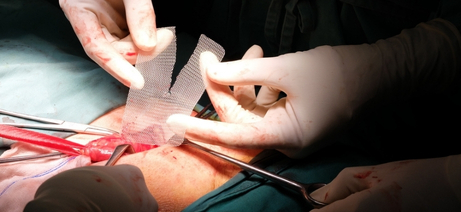Inguinal (Groin) Hernia
 Hernia.jpg)
Inguinal (Groin) Hernia Treatment In Pune & Mumbai
What is an Inguinal Hernia?
An inguinal hernia is a condition where a portion of the intestine or fat protrudes through a weak area in the lower abdominal wall, close to the groin. Inguinal hernias are more prevalent in men and may arise because of strain, muscle weakness, or age. Some hernias are small and do not hurt but can become large and painful, which may need medical treatment.
Symptoms of Inguinal Hernia
- A tender bulge in the scrotum or groin that becomes more apparent when standing, straining, or coughing.
- Pain or discomfort in the groin, particularly with physical exertion or heavy lifting.
- A feeling of heaviness or pulling in the lower abdomen.
- In extreme conditions, a trapped (incarcerated) hernia can result in nausea, vomiting, and constipation, and needs immediate treatment.
Causes & Risk Factors
Inguinal hernias develop due to weakness in the abdominal muscles, which can be present from birth (congenital) or develop over time due to:
- Heavy lifting or strenuous physical activity
- Chronic coughing or constipation, increasing abdominal pressure
- Aging and muscle deterioration
- Obesity, which adds strain on the abdominal wall
Treatment Options for Inguinal Hernia
 Hernia Repair.jpg)
1. Laparoscopic (Minimally Invasive) Hernia Repair
This advanced technique involves small incisions and a camera-guided approach to repair the hernia using a surgical mesh. Laparoscopic surgery offers:
- Smaller scars and faster recovery
- Less post-surgical pain
- A lower risk of recurrence
2. Open Hernia Repair (Herniorrhaphy or Hernioplasty)
In this conventional procedure, the surgeon cuts over the hernia, pushes the bulging tissue back, and supports the area with stitches or a mesh. It is effective for more serious or larger hernias.


3. Watchful Waiting (For Small, Painless Hernias)
If the hernia is minor and is not painful, a physician might advise keeping an eye on it rather than surgical intervention. Nonetheless, surgery remains the sole definitive measure to avert complications.
Why is Early Treatment Important?
Neglecting an inguinal hernia can result in serious complications such as strangulation, inwhich the intestine becomes cut off from its blood supply and a life-threatening emergency necessitating immediate surgery. Early medical consultation can avoid such dangers and lead to an easy recovery.
FAQ'S
An inguinal hernia occurs when tissue, such as part of the intestine, protrudes through a weak spot in the abdominal muscles in the groin area. This results in a noticeable bulge, which may be painful, especially when bending over, coughing, or lifting.
Inguinal hernias can result from increased pressure within the abdomen, a pre-existing weak spot in the abdominal wall, straining during bowel movements or urination, heavy lifting, or chronic coughing or sneezing. They are more common in men due to natural weaknesses in the groin area.
A healthcare provider typically diagnoses an inguinal hernia through a physical examination. They may ask you to stand and cough to observe the hernia's bulge. In some cases, imaging tests like an ultrasound or CT scan may be used to confirm the diagnosis.
No, inguinal hernias do not heal without treatment. While some may remain asymptomatic for a period, they often enlarge over time and can lead to complications. Surgical repair is the definitive treatment.




